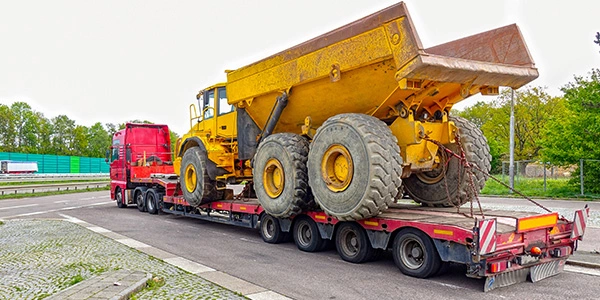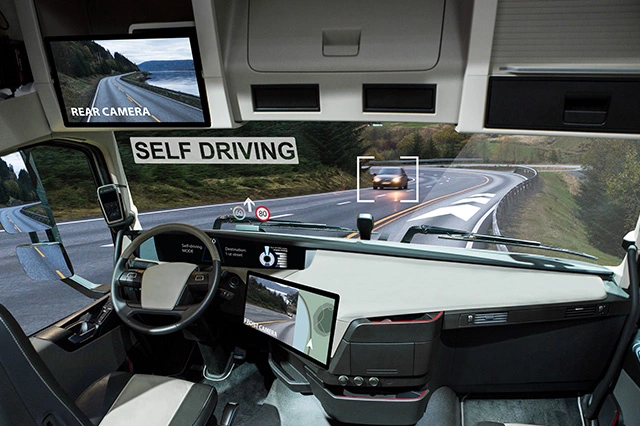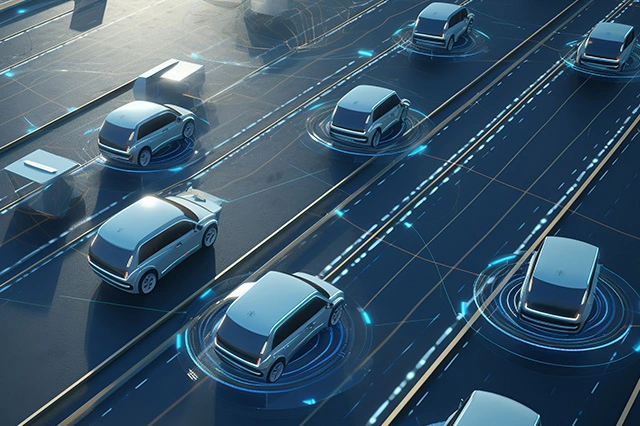Comparing affordable low loader insurance doesn’t need to be complicated. Understanding what you need in a policy and being able to quickly compare quotes is all that’s needed to make sure your vehicle is fully covered when on the road.
“Low loader” is sometimes used an umbrella term for low HGVs and trailers in the UK. It can be used to describe a number of vehicles including semi low-loaders, step frame trucks, gooseneck trailers and plant trailers.
What is Low Loader Insurance?
Low loaders are trucks or vans with a lower floor and often no sides. They are commonly used for transporting heavy goods like machinery or tall cargo. Unlike most standard trailers a low loader can carry goods up to 12 ft tall. Of course, this can mean they are more dangerous than some other vehicles when involved in accidents on the road, which is why insurance is crucial.
A vehicle on the road in the UK legally needs insurance, it doesn’t matter whether it’s a low loader, HGV of any kind, or a van. If it drives from point A to point B (or even if it is stored and operated on private land) it needs to be insured. Your level of cover will vary depending on the policy you choose. Most businesses operating low loaders will need insurance that covers the vehicle, the driver and any third parties should any damages or injuries occur.
How our process works
We’ve worked hard to refine our process and keep it as quick, easy and simple as possible for our customers.
Who Needs Low Loader Insurance?
Low loader insurance is most commonly needed by businesses or those operating fleets of HGVs or trucks.
Not only is insurance for a low loader a legal requirement but it also protects a significant asset for a company, one that can be very expensive to replace if not properly covered. When your business or day-to-day operations rely on vehicles it becomes even more important to properly consider insurance, every day that a vehicle is off the road can be a day of lost income.
Operators of goods vehicles like low loaders and flatbeds need an operators licence in the UK.
Types of Low Loader Truck Insurance
As with most motor insurance policies, there are a variety of cover levels to consider and even some specialist policies that may be more suitable.
Basic Low-Loader Insurance
- Third Party: covers third party damage but won’t cover repairs to the insured low loader or the injuries to the driver.
- Third Party, Fire & Theft: covers third party damages plus and vehicle damage directly caused by fire or theft. It will not cover accidental damage to the low loader.
- Fully Comprehensive: covers third-party damage plus any damage to the low loader insured. It will also typically cover injuries to the driver and legal expenses. Many fully comprehensive policies will also have other benefits.
Haulage or HGV Fleet Insurance
Many businesses that have low loaders or tippers insure vehicles through a company fleet policy. These are recommended where there are 2 or more HGVs to be covered. You should be aware that some providers may have a maximum number of HGVs allowed to be covered under a single policy.
A HGV fleet policy is generally more affordable than individual insurance policies and will often be easier to manage.
Telematics For Low Loaders
Many insurers will provide discounted insurance quotes where an owner takes extra precautions to ensure the security of the vehicle.
Telematics insurance policies for HGVs require a black box or an app. They will then use driver data to calculate premiums, with safer drivers being rewarded with reduced rates. Similarly, they can be used to highlight dangerous driving and this can increase insurance costs on a low loader or HGV.
What’s Included In a Low Loader Insurance Policy?
Every policy is slightly different which is where you’ll see benefits in comparing low loader insurance quotes or speaking to a broker.
Common features to look for when you’re comparing policies include:
- Breakdown Cover
- Public Liability Insurance
- Employer Liability Insurance
- Hire and Reward Cover
- Replacement Vehicle Cover
- Windscreen Cover
- Haulage/Goods in Transit Cover
- Flexible Payment Options
- 24hr Assistance For Claims Out Of Traditional Hours
- Protected No Claims
How Much Does Low Loader Insurance Cost?
There’s no concrete answer to this question. There are many factors that contribute to insurance costs, including vehicle and individual driver details.
Low loader insurance, like most HGV insurance, is expected to be more expensive than your standard car or van insurance policy. The vehicles are considered to be higher risk, they cover more miles and they require a more skilled driver.
There are a few things that fleet managers and drivers can do to try and keep insurance costs down.
How To Get Cheap Low Loader Insurance
More experienced (and qualified) drivers will often get more affordable quotes for low loader insurance, as will drivers with a history of no claims.
You can help to reduce costs by making sure drivers have the correct licences and also checking there is no history of disqualification or driving convictions – this can significantly increase the cost of HGV insurance policies.
Improving security can help to reduce insurance costs. This can be as simple as storing the vehicle in a secure location overnight or it can mean looking into telematics and even cameras to help prove fault should an accident occur.
It’s always important to look for good deals when it comes to insurance. When choosing you should be aware to not sacrifice cover for cost in cases like HGV and low loader insurance where costs for repairs are significant should the policy not be right.
Frequently Asked Questions
Related News
Green Haulage in the UK: Paving the Way for a Sustainable Future
The United Kingdom is at a crossroads in its transportation and logistics industry, particularly in the sector of haulage, where the push towards greener, more sustainable practices is not just a matter of regulatory
The Benefits of Telematics Insurance: A Comprehensive Guide
Telematics insurance, also known as black box insurance, is revolutionising the way individuals and businesses manage their vehicle operations. By leveraging technology that monitors driving behaviour and vehicle usage, telematics insurance offers a range
Telematics. How Does It Work and What Are The Benefits?
Vehicle telematics is a multifaceted technology that integrates telecommunications and informatics to provide a variety of functions and services in vehicles. It's primarily used for monitoring vehicle location, movements, status, and behaviour. Telematics technology





